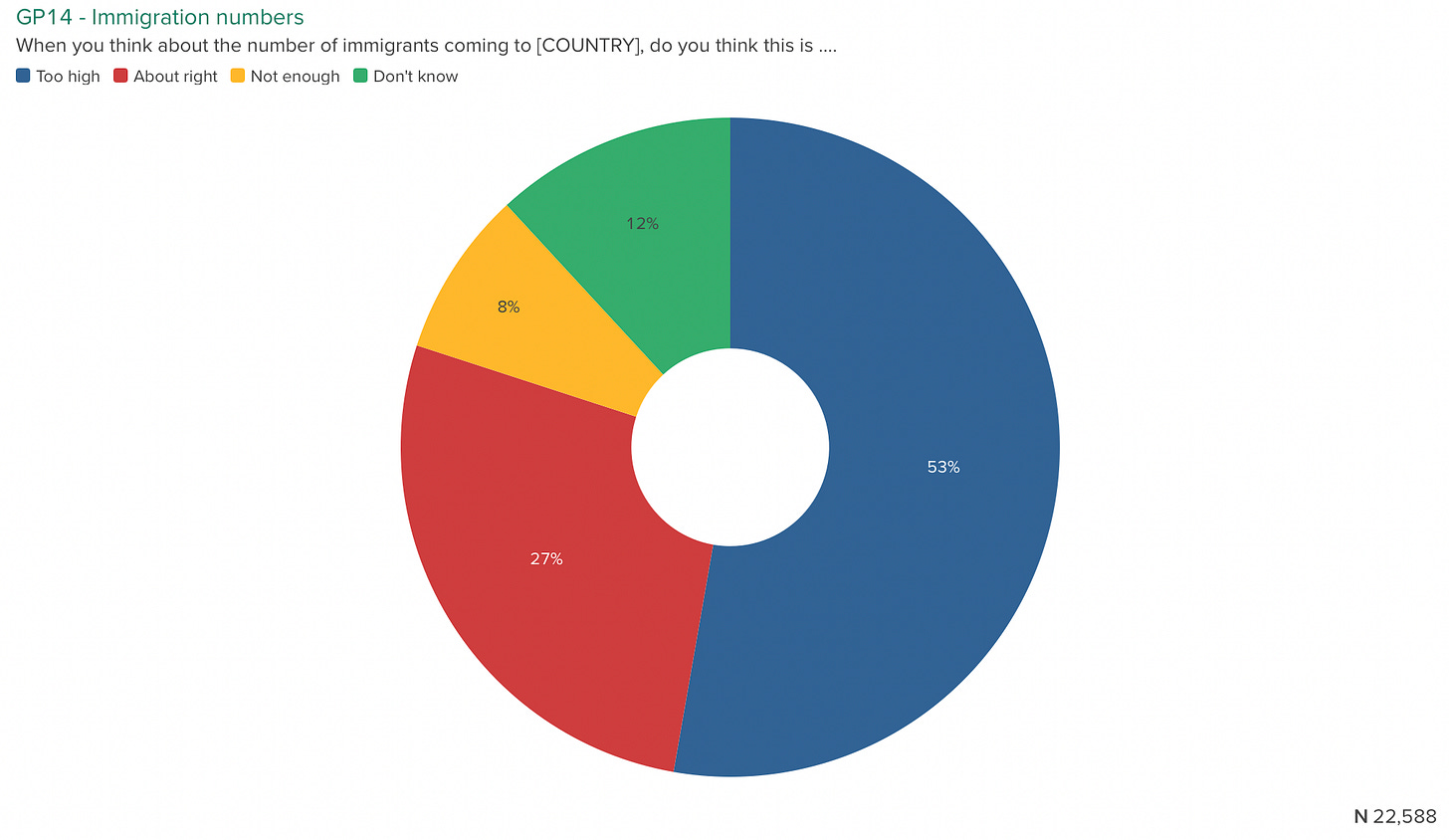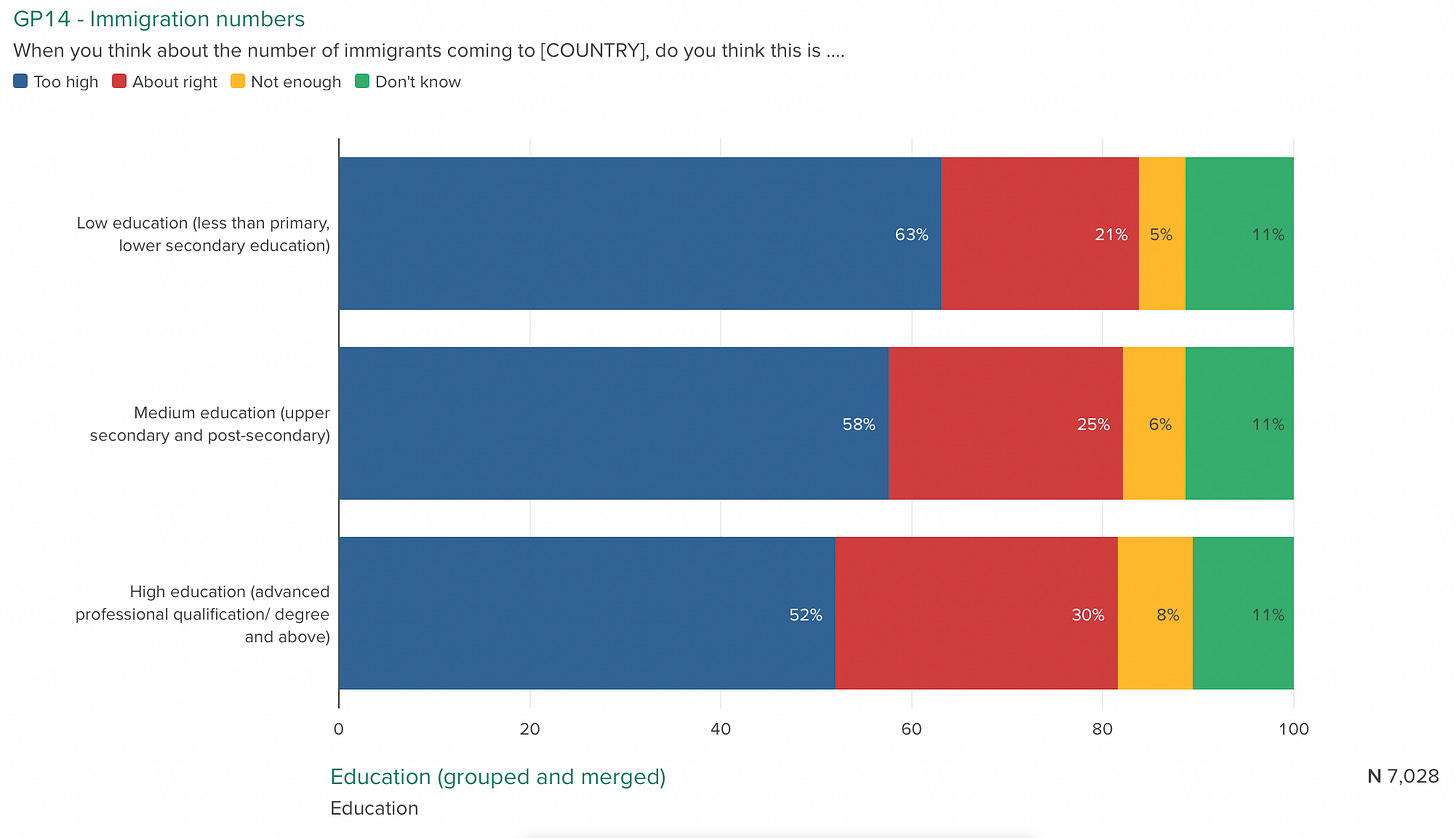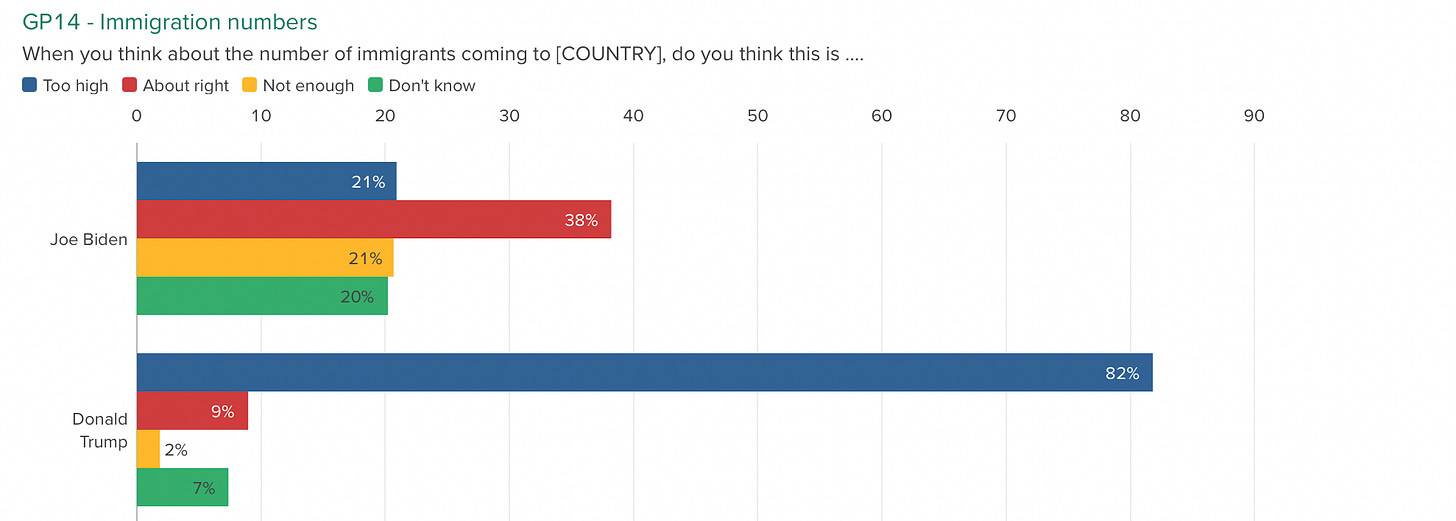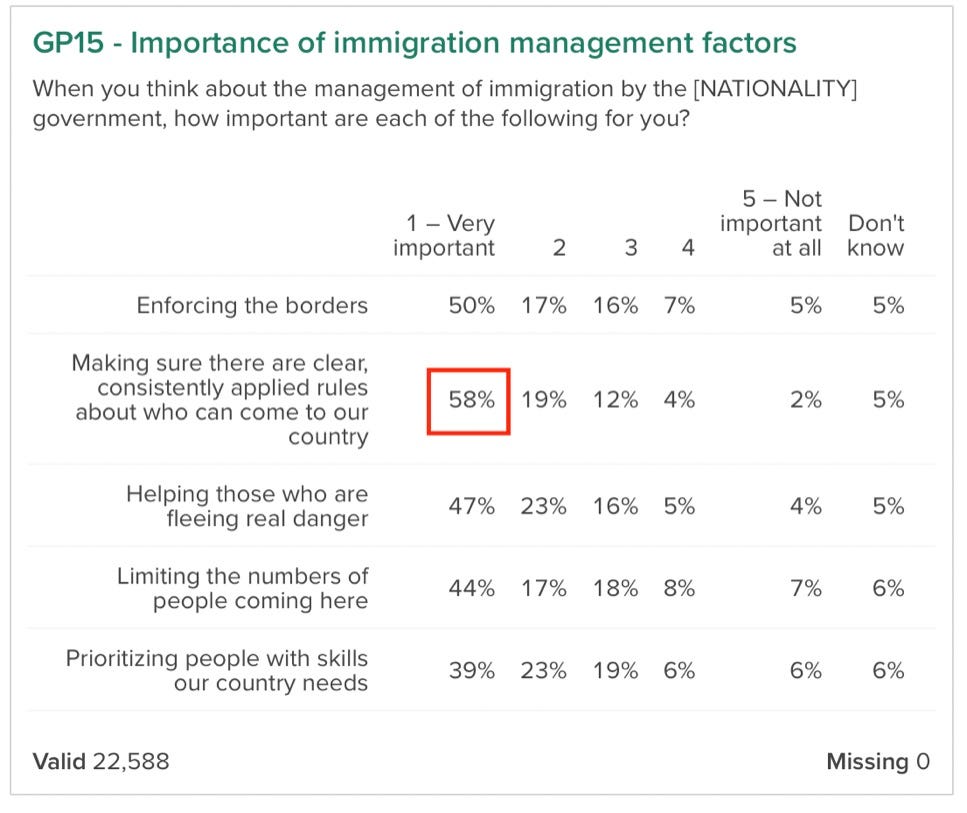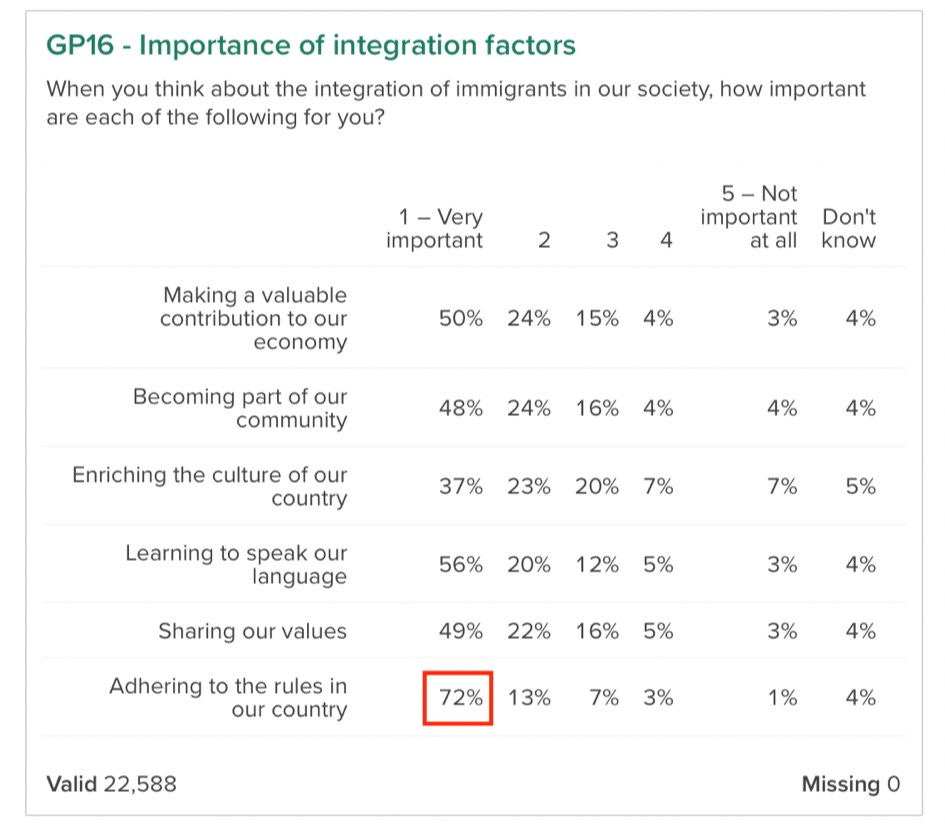Immigration is Contentious Across the World
A global survey reveals that citizens in leading democracies want stricter adherence to rules above all else—on borders and in terms of integration.

The issue of immigration continues to cause great political controversy in many countries. In TLP’s final examination of a comprehensive multinational survey, we find that pluralities or majorities of citizens in nearly every country tested believe that the number of immigrants coming into their country is too high. Consequently, people in different national contexts express a strong desire for clear and consistent rules about who is allowed to enter the country and what immigrants must do once they arrive.
These findings are based on analysis of 22,000 interviews with citizens in 20 leading democratic countries, conducted by YouGov and Global Progress ahead of the G20 summit in Rome. TLP was fortunate to work on this project, and has offered previous analysis of the overall results, along with important findings on culture wars, democracy, and climate change.
Most citizens in 20 leading democratic countries believe that the number of immigrants coming into their country is too high. As seen in the pie chart below, 53 percent of respondents across all 20 countries surveyed say that the number of immigrants arriving in their country is too high, while around one quarter of people believe the number of immigrants is about right. Less than 1 in 10 citizens globally feel that there are not enough immigrants coming into their country.
New Zealand is the only country examined where a plurality of citizens believe that the number of immigrants coming into their country is about right rather than too high. People in Portugal are split on the matter. But in the 18 other countries included in the study, pluralities or majorities of citizens say immigration numbers are too high.
The countries with majorities of citizens expressing concern about immigration levels being too high include: South Africa (78 percent); Mexico (77 percent); Italy (64 percent); Sweden (63 percent); Spain (61 percent); France (61 percent); the Netherlands (60 percent); Indonesia (60 percent); the Czech Republic (54 percent); Germany (52 percent); and Hungary (52 percent). The countries with pluralities of citizens concerned about immigration being too high include: Poland (48 percent); Brazil (48 percent); the U.K. (45 percent); India (44 percent); the U.S. (44 percent); Australia (39 percent); and Canada (39 percent).
Looking closer at demographic patterns across all 20 countries, we find that concerns about immigration being too high go up with age and down with educational attainment. For example, Generation Z voters globally are split on the matter of proper immigration numbers, while older generations worry much more about immigration numbers being too high.
Likewise, all educational groups say that immigration numbers are too high, but this drops from 63 percent among those with lower levels of education to 52 percent among the highest educated citizens.
In terms of ideology, all groups examined believe that the number of immigrants coming into their respective countries is too high, except for those who classify themselves as “fairly left-wing” or “slightly left of center” who believe by a slight margin that the number is about right.
On the political front, the issue of immigration numbers being too high clearly divides many parties in many countries. This is most apparent in a country like Italy, where 90 percent of far-right Lega Party voters say the number of immigrants is too high compared to 39 percent of Democratic Party voters who say immigration levels are about right.
Similar party divides on immigration are seen in the United Kingdom and the United States, where conservative and more progressive parties clearly do not see eye-to-eye on the matter. For example, 68 percent of Conservative Party voters in the U.K.—and 79 percent of Brexit Party voters—say that the number of immigrants coming into Great Britain is too high. In contrast, a slight plurality of Labour Party voters (30 percent) think the number of immigrants is about right, while 34 percent of Liberal Democrat voters and 32 percent of Scottish National Party voters feel that there are not enough immigrants coming into Britain.
In the United States, immigration is obviously a major dividing line between Joe Biden and Donald Trump voters: 82 percent of Trump voters say immigration numbers are too high versus 38 percent of Biden voters who say immigration numbers are about right.
Citizens globally believe it is most important for their government to have clear, consistent rules about who can come into the country and also desire better enforcement of the borders. Looking at the chart below, 58 percent of citizens across these 20 democracies say that it is very important for their government to have clear, consistently applied rules about who can come into the country, and 50 percent also feel it is very important for their government to enforce the borders. These factors score slightly higher than limiting immigration numbers overall and highlight the importance of fair rules and better management to voters. Factors such as prioritizing people with skills (39 percent) and helping those fleeing danger (47 percent) are also seen as very important priorities for government—just not at the same level as rules and border enforcement.
In terms of integration of immigrants, citizens globally clearly care most about new arrivals adhering to established rules within their societies. As seen below, more than 7 in 10 citizens across these 20 countries say that it is very important to them to see immigrants adhering to the rules in their country, scoring much higher in importance than factors such as learning to speak the national language (56 percent) or sharing national values (49 percent).
Looking specifically at those citizens who say that immigration numbers are too high, these factors centered on adhering to rules, learning national languages, and sharing values are all seen as very important goals in terms of managing integration, along with economic contributions from immigrants.
Combined, these global survey results present a stark reality for governments and political parties thinking through contentious issues surrounding immigration.
Most people in most places believe that there are too many immigrants arriving in their country. The desired solution is not necessarily to erect quotas on immigration. Rather, citizens want clear and consistent rules about who can enter along with stronger adherence to established domestic rules by immigrants themselves.
People across the world are open to humane immigration policies but clearly want well-managed systems and stronger border enforcement above all else.





